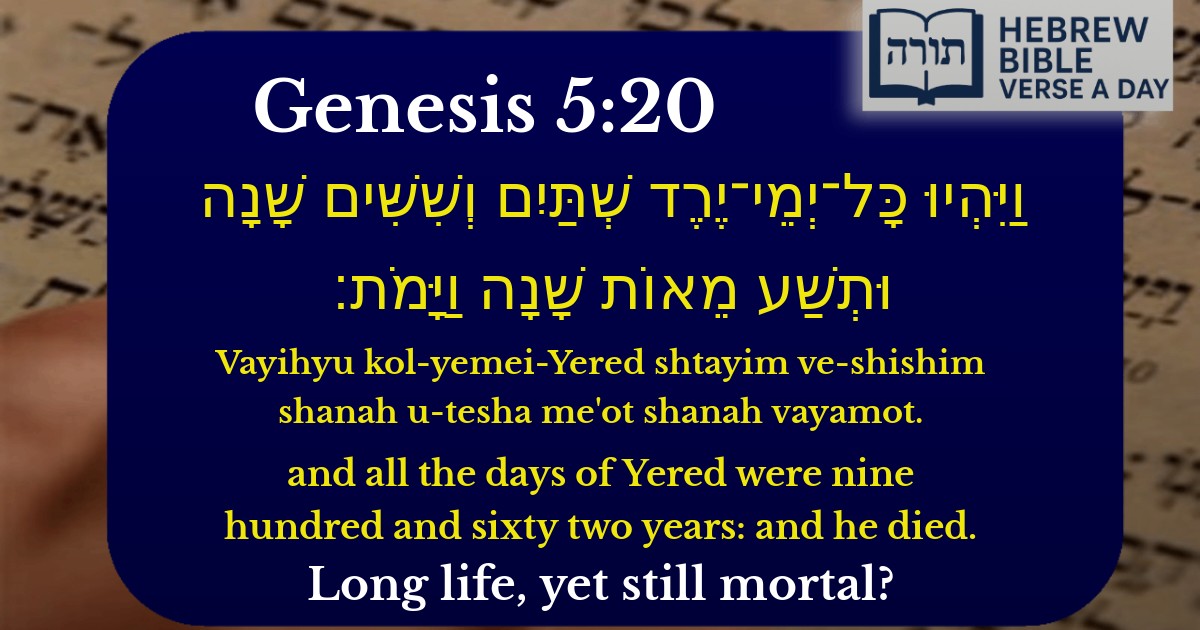Join Our Newsletter To Be Informed When New Videos Are Posted
Join the thousands of fellow Studends who rely on our videos to learn how to read the bible in Hebrew for free!
Hebrew Text
וַיִּהְיוּ כָּל־יְמֵי־יֶרֶד שְׁתַּיִם וְשִׁשִּׁים שָׁנָה וּתְשַׁע מֵאוֹת שָׁנָה וַיָּמֹת׃
English Translation
and all the days of Yered were nine hundred and sixty two years: and he died.
Transliteration
Vayihyu kol-yemei-Yered shtayim ve-shishim shanah u-tesha me'ot shanah vayamot.
Hebrew Leining Text
וַיִּֽהְיוּ֙ כׇּל־יְמֵי־יֶ֔רֶד שְׁתַּ֤יִם וְשִׁשִּׁים֙ שָׁנָ֔ה וּתְשַׁ֥ע מֵא֖וֹת שָׁנָ֑ה וַיָּמֹֽת׃ <span class="mam-spi-samekh">{ס}</span>
וַיִּֽהְיוּ֙ כׇּל־יְמֵי־יֶ֔רֶד שְׁתַּ֤יִם וְשִׁשִּׁים֙ שָׁנָ֔ה וּתְשַׁ֥ע מֵא֖וֹת שָׁנָ֑ה וַיָּמֹֽת׃ {ס}
🎵 Listen to leining
Parasha Commentary
📚 Talmud Citations
This verse is not quoted in the Talmud.


Longevity of Yered in the Generations Before the Flood
The verse states that Yered lived for 962 years, which aligns with the extended lifespans recorded in the generations before the Mabul (Flood). Rashi (Bereshit 5:20) notes that the lengthy lives of these early generations were due to the original divine plan for humanity to live much longer, before the decree of the Flood gradually reduced human lifespans. The Sages teach that this was a manifestation of Hashem's patience, giving humanity ample time to repent before bringing judgment.
Significance of Yered's Name and Lifespan
The name "Yered" (יֶרֶד) comes from the root י.ר.ד, meaning "descent." The Midrash (Bereshit Rabbah 23:7) connects this to the spiritual decline that began in his generation, as idolatry started to spread. Ramban (Bereshit 5:20) suggests that Yered's long life was a test—despite witnessing moral deterioration, he did not fully succeed in reversing the trend, though he was righteous enough to be spared from the Flood (as he died before it).
Yered in the Chain of Generations
Lessons from Yered's Life
The Seforno (Bereshit 5:20) emphasizes that Yered's long life, like those of his contemporaries, was meant to allow for the accumulation of wisdom and the establishment of civilization. However, the fact that he "died" (וַיָּמֹת) without additional praise—unlike Chanoch or Noach—suggests that his righteousness was incomplete. This serves as a reminder that longevity alone is not a virtue unless accompanied by spiritual growth.